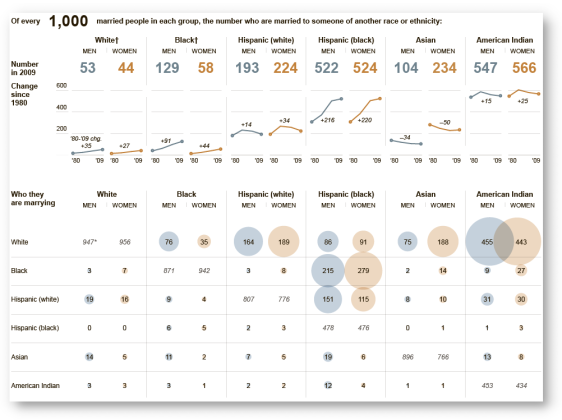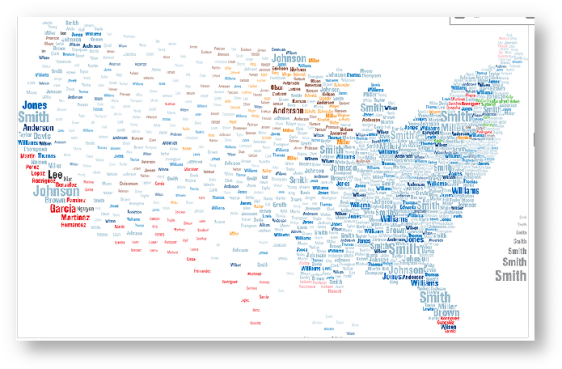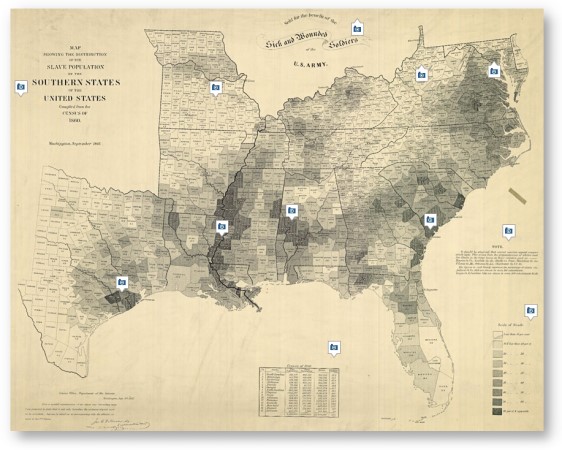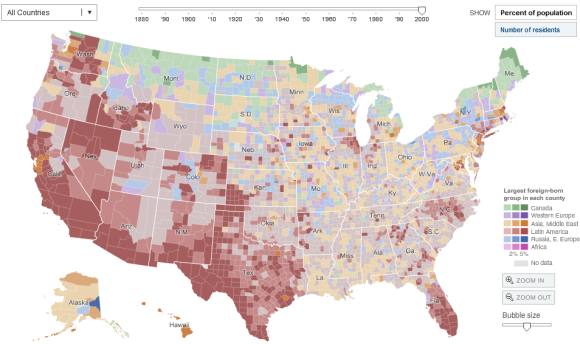In my travels around the internet, I recently came across three interesting infographics related to race/ethnicity and immigration.
The first one is a “Map of American Slavery,” published in the New York Times (small thumbnail below, you can click on it to go to the larger version at the NY Times site). For casual historians like me, it is interesting to see that the counties that had the highest concentration of slaves were generally located along the Mississippi River and whose labor was in demand the most to facilitate trade, further reinforcing the notion that so much of the American south’s economy was fundamentally tied to slavery.
The second interesting infographic is entitled “Who is Marrying Whom,” also was published by the New York Times, and shows a visual breakdown of interracial marriage across the major racial/ethnic groups in the U.S. (again, you can click on the thumbnail below to see the full-size version). In looking it over, some of the most interesting results are:

- The groups that seem to have the highest rates of being interracially married are American Indians and Black Hispanics.
- The largest gender disparities are among Blacks and Asian Americans, although the gender pattern is the opposite for each: Black men are 124% more likely to be interracially married than Black women, while Asian American women are 125% more likely to be married interracially than Asian American men.
- Since around 1990 or so, interracial marriage rates have actually been declining for White Hispanics and American Indians. Moreover, for Asian Americans, they’ve been generally declining since 1980. For White Hispanics and Asian Americans, I believe much of this decline is due to the large influx of immigrants since the ’80s and ’90s, many of whom are already married as they arrive in the U.S. or are less likely to intermarry in general. As such, it would be interesting to see these same numbers for just U.S.-raised members of these racial groups (those who were born in the U.S. or arrived at at 13 or younger and therefore, and therefore were socialized within the U.S. racial landscape).
The interracial marriage graphic is linked to an interesting article also on the NY Times site that discusses the growing multiracial/mixed-race population in the U.S. and how they are increasingly forging their own identity that combines elements of both sides of their ancestry, rather than trying to fit themselves into preexisting and frequently narrowly-defined racial/ethnic categories, as this video clip shows:
A third interesting infographic was published by the National Geographic Society, titled “What’s in a Surname?” and shows some of the most common surnames in different geographic parts of the U.S. The map confirms what demographers have noted for some time now — racial/ethnic minorities (represented here by their surnames) are increasingly becoming the majority population in many parts of the U.S. (again, click on the thumbnail below to view the larger interactive graphic at the National Geographic Society site).

As one example, in the southern California part of the map, some of the most common surnames are Garcia, Martinez, Hernandez and even Nguyen (a nod to the huge Vietnamese American “Little Saigon” community in Orange County). There are further large concentrations of Latino surnames (represented in red) in the southwestern U.S., southern Florida, and upstate New York as well. And unbeknown to me, there is apparently a large contingent of Koreans named “Kim” in central California.





